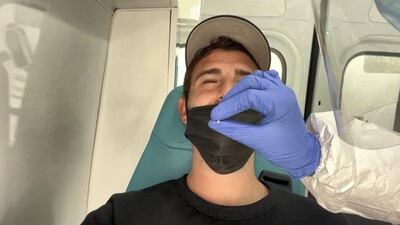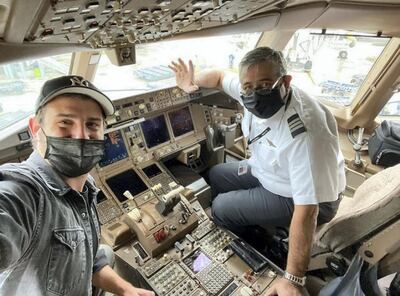While 2020 was a year like no other, for the travel industry, in particular, it was a disaster.
Practically overnight, demand for travel evaporated as authorities around the world shut down borders, grounded planes and issued travel restrictions to halt the spread of Covid-19.
But for James Asquith, 30, who previously set a Guinness World Record for being the youngest man to travel to every country in the world, a global pandemic wasn’t enough to keep him grounded.
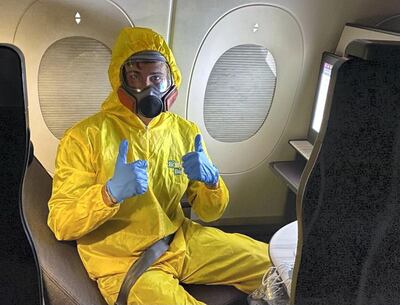
As founder and chief executive of home-sharing platform Holiday Swap, Asquith needs to be in the air much of the year for work purposes.
During the pandemic, he has taken more than 150 flights, had more than his fair share of PCR tests and navigated plenty of cancelled flights.
“I've had to keep travelling for work, for the finance side of our business," explains Asquith. "I'm proud that over the last year we've actually grown the team, we've hired more people and been able to support livelihoods by doing that."
At a time when most travel and tourism businesses are struggling, it’s an impressive feat. However, the practicalities of travelling at a time when many authorities are advising people to stay home are challenging.
“There’s been lots of flight cancellations. I had 45 last year, and I’m probably up at about 24 this year, so far," says the British entrepreneur.
Having caught the travel bug after joining some friends on a volunteer trip to Vietnam in 2008, Asquith returned home and booked his first solo trip, bound for Egypt. That's where his passion for travel was really cemented, when he was 18. He then spent the next six years visiting all 196 countries around the world.
Perhaps surprisingly, travelling during the pandemic has brought back memories of some of his earlier travel experiences.
"Travelling today reminds me a little of how it used to be. Like back in the day, getting into somewhere like Sudan was impossible. Just getting the visa and finding flights was a victory, and now that's kind of the case for other places around the world."
On the hunt for PCR tests
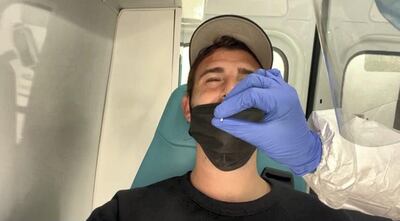
“I've taken 67 PCR tests now,” says Asquith. “I still haven't caught Covid-19, and I think it demonstrates that there is a way to travel safely.”
For the most part, Asquith says he has felt completely safe, although he has also been taking extra precautions. "I've taken more tests than I should have done, just before I'm seeing people, etc, just to be safe."
That in itself has proven to be a challenge. For the travel aficionado, getting a PCR test in New York City was one of the biggest hurdles on his itinerary in the last year.
"It's impossible to get a test there, and it's incredible that one of the world's first-world countries is one of the hardest places to get a PCR test," he says.
"It's pretty interesting to see how the situation varies between places. In the UAE it's super easy to get [a test]. The UK is quite difficult. And depending on the airline, a PCR test is required within 24, 48 or 72 hours, but test results might not even be ready within those turnaround times, so it's a logistical challenge."
Summer in Europe: empty streets and crowd-free landmarks
Continuing to travel during the pandemic has also delivered some unique rewards. While Asquith claims he isn't travelling for tourism purposes, the impact of restrictions on popular destinations and landmarks have not passed him by.
"Last summer, when Europe was having a bit of a renaissance and opened up a little again, I was in Milan, where normally it would be packed. I love European summers, but they can be kind of miserable with all the crowds, and it was nice to see the place a little bit empty. Anyone could have just walked into the Duomo if they wanted, whereas usually you have to get tickets weeks in advance."
He's also dealt with some less thrilling moments.
"Transiting in Addis Ababa in Ethiopia was a nightmare; it was one of the worst places I've seen, with zero social distancing measures. It was a mess there, but other places and other airports, particularly in the Middle East, and in the US as well, seem pretty safe."
'Vaccine passports will be instrumental in a rebound'
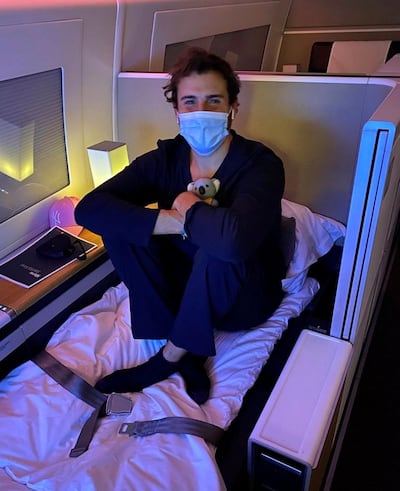
As the world of travel slowly begins to reopen and travellers cautiously take to the skies again, Asquith expects that vaccinations will play a critical role in the industry's resurgence.
"Vaccine passports will be instrumental in a rebound. I think that by July or August, countries will already start implementing the need for vaccine passports for people to be able to travel."
While he's not yet been inoculated in the UK, because of age restrictions, Asquith is keen to get his Covid-19 vaccination as soon as it's available to him.
"Unfortunately, a lot of the developing world will get left behind. I believe many places, especially in Africa, won't see vaccinations on a mass scale until later next year or even 2023, and then with that you're going to get countries not allowing travellers to visit from those destinations."
Budget travellers will need to act fast

And when travel does come back, are cheap deals and bargain holidays set to be the norm? "I think people will be able to find travel bargains everywhere, but for a very short period of time," says Asquith.
"From cruises and trips to Greece or Italy, or long-haul business class flights, there are going to be deals to be found, because that's how economics works. Companies will put out cheap prices to suck people in, and then as soon as the demand is back, prices will shoot up."
The entrepreneur also believes that the global pandemic has drawn to a close the second golden age of travel.
"The first golden age was the days of Pan Am and TWA, jumbo jets and open lounges on the top decks of planes, while the second golden age came via mass transportation.
"In the early 2000s, when low-cost airlines sprung up everywhere, it allowed more of the masses to travel. You could find long-haul flights for $100 and short-haul prices for about $20. This opened up travel and, in some ways, it got too much.
"So, on the positive side, there is likely to be a reset, but, from now on, the travel industry is not going to see anything like that again. Things have changed and the days of low-cost travel are gone."
